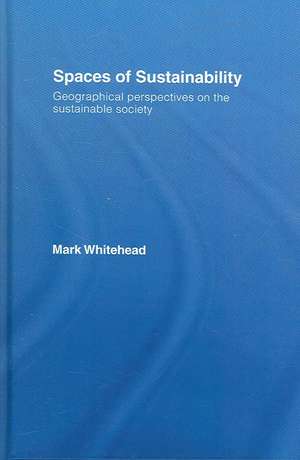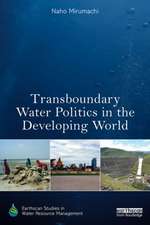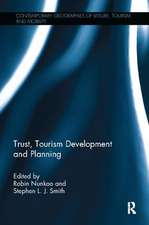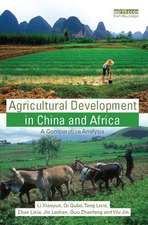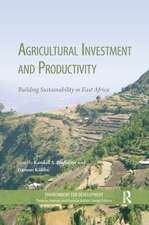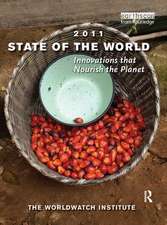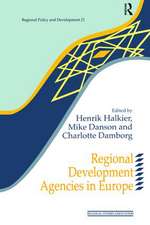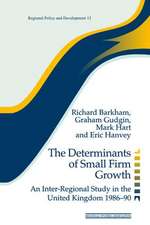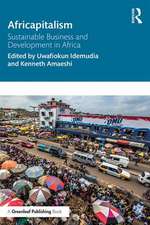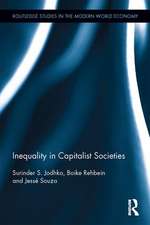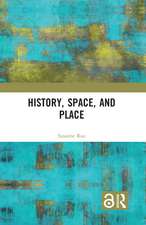Spaces of Sustainability: Geographical Perspectives on the Sustainable Society
Autor Mark Whiteheaden Limba Engleză Hardback – 3 noi 2006
Combining the latest research and theoretical frameworks Spaces of Sustainability offers a unique insight into contemporary attempts to create a more sustainable society and introduces the debates surrounding sustainable development through a series of interesting transcontinental case studies. These include: discussions of land-use conflicts in the USA; agricultural reform in the Indian Punjab; environmental planning in the Barents Sea; community forest development in Kenya; transport policies in Mexico City; and political reform in Russia.
Written in an approachable and concise manner, this is essential reading for students of geography, planning, environmental politics and urban studies. It is illustrated throughout with figures and plates, along with a range of explanatory help boxes and useful web links.
| Toate formatele și edițiile | Preț | Express |
|---|---|---|
| Paperback (1) | 436.87 lei 6-8 săpt. | |
| Taylor & Francis – 26 oct 2006 | 436.87 lei 6-8 săpt. | |
| Hardback (1) | 1494.30 lei 6-8 săpt. | |
| Taylor & Francis – 3 noi 2006 | 1494.30 lei 6-8 săpt. |
Preț: 1494.30 lei
Preț vechi: 1822.32 lei
-18% Nou
Puncte Express: 2241
Preț estimativ în valută:
285.97€ • 310.52$ • 240.21£
285.97€ • 310.52$ • 240.21£
Carte tipărită la comandă
Livrare economică 22 aprilie-06 mai
Preluare comenzi: 021 569.72.76
Specificații
ISBN-13: 9780415358033
ISBN-10: 0415358035
Pagini: 256
Ilustrații: 32 b/w images, 2 tables, 21 halftones and 9 line drawings
Dimensiuni: 156 x 234 x 18 mm
Greutate: 0.57 kg
Ediția:1Adnotată
Editura: Taylor & Francis
Colecția Routledge
Locul publicării:Oxford, United Kingdom
ISBN-10: 0415358035
Pagini: 256
Ilustrații: 32 b/w images, 2 tables, 21 halftones and 9 line drawings
Dimensiuni: 156 x 234 x 18 mm
Greutate: 0.57 kg
Ediția:1Adnotată
Editura: Taylor & Francis
Colecția Routledge
Locul publicării:Oxford, United Kingdom
Public țintă
Postgraduate and UndergraduateCuprins
1. The Geographies of the Sustainable Society Part 1: Spaces of Sustainability 2. Ecological Modernization in the West: Making Business Sense out of Sustainability 3. Sustainable Development in the Post-Socialist World 4. The Pollution of Poverty: Sustainability in the Developing World Part 2: Scales of Sustainability 5. Sustainability in a Global Era 6. The Sustainable Region 7. Sustainable Cities 8. Localizing the Sustainable Society: Between Citizenship and Community 9. Conclusions: Reflections on Actually Existing Sustainabilities
Notă biografică
Mark Whitehead is a lecturer in human geography at the Institute of Geography and Earth Sciences at the University of Wales, Aberystwyth.
Recenzii
'This book is about ideas and approaches to sustainability [...] it is an excellent introduction to the topic for geographers' - Ian Gordon, University of Manchester Geography (Journal) 2007.
'Whitehead has envisioned Spaces of Sustainability as an introduction to the key debates and philosophical principles surrounding sustainable development and, in this regard, he succeeds admirably. In a concise fashion, he provides the reader with a well-informed and eminently readable overview of the key debates, theories and philosophical concepts, and policy initiatives in the realm of sustainable development. Furthermore, throughout the book he synthesizes a diverse collection of literature from both academia and the mass media and provides an eclectic and interesting array of real-world case studies drawn from a host of more and less developed countries [...] As a consequence, Spaces of Sustainability will serve as a valuable introduction for upper-level undergraduate students in geography, planning, public policy, and other social science disciplines in a wide variety of geographic settings' James, J. Biles, Indiana University, Growth and Development (November 2007)
'What is sustainability from a geographical point of view? Whitehead, in Spaces of Sustainability aims to answer this question through a review of the roots of the concept of sustainability...' - Giuseppe Pellegrini Masini, University of Glasgow (2008)
'The book is at its best when we encounter the realities of these sustainable societies – in the Body Shop, films, Mexico City and the everyday encounters of the author – and are given the analytical perspectives through which to understand the processes at hand. The detailed use of case-studies, the accessible text and the use of figures and text boxes all help with this endeavour. It deserves to have pride of place on reading lists across the social sciences and to be taken seriously by the research community.' - Harriet Bulkeley, University of Durham, UK 2008
'Whitehead has envisioned Spaces of Sustainability as an introduction to the key debates and philosophical principles surrounding sustainable development and, in this regard, he succeeds admirably. In a concise fashion, he provides the reader with a well-informed and eminently readable overview of the key debates, theories and philosophical concepts, and policy initiatives in the realm of sustainable development. Furthermore, throughout the book he synthesizes a diverse collection of literature from both academia and the mass media and provides an eclectic and interesting array of real-world case studies drawn from a host of more and less developed countries [...] As a consequence, Spaces of Sustainability will serve as a valuable introduction for upper-level undergraduate students in geography, planning, public policy, and other social science disciplines in a wide variety of geographic settings' James, J. Biles, Indiana University, Growth and Development (November 2007)
'What is sustainability from a geographical point of view? Whitehead, in Spaces of Sustainability aims to answer this question through a review of the roots of the concept of sustainability...' - Giuseppe Pellegrini Masini, University of Glasgow (2008)
'The book is at its best when we encounter the realities of these sustainable societies – in the Body Shop, films, Mexico City and the everyday encounters of the author – and are given the analytical perspectives through which to understand the processes at hand. The detailed use of case-studies, the accessible text and the use of figures and text boxes all help with this endeavour. It deserves to have pride of place on reading lists across the social sciences and to be taken seriously by the research community.' - Harriet Bulkeley, University of Durham, UK 2008
Descriere
This book is an introduction to the ways in which the discipline of geography can be used to analyze and assess the emerging sustainable society.
